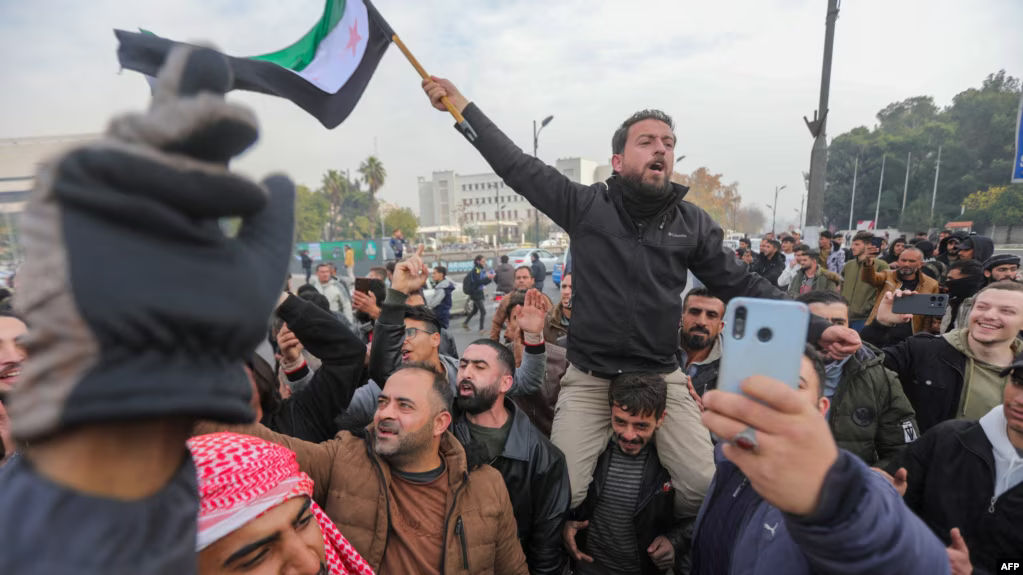Syria’s Turning Point, Rebel Takeover and Assad's Retreat to Moscow

Table of Contents
The conflict in Syria has reached a historic turning point, with rebel forces gaining control of Damascus. After years of devastating war, the citizens of Syria hold cautious hope for a brighter future. This development comes as President Bashar al-Assad reportedly flees to Moscow, leaving the nation in turmoil. For many Syrians, this moment represents both a relief and uncertainty about what lies ahead. Amid this dramatic shift, global attention is focused on the country’s next chapter.
Syria's civil war has left countless lives in ruins, with millions displaced and cities reduced to rubble. As rebel forces solidify their gains, they promise a new era of tolerance and democracy. However, questions remain about their long-term intentions and ability to unify the country. This article explores the unfolding events, the implications for Syrian citizens, and the geopolitical ripples across the region.
In a dramatic turn of events, rebel forces have seized control of Damascus after years of intense conflict. Led by Hayat Tahrir al-Sham (HTS), the offensive swept through major cities and towns, culminating in the capture of the capital. HTS leaders have declared this victory a new beginning for Syria, emphasizing religious tolerance and multiculturalism.
However, analysts remain skeptical of HTS’s assurances due to its Islamist identity and past affiliations with groups like al-Qaeda. Despite this, many Syrians see the fall of Damascus as a long-overdue liberation. Ghalib Al-Hajouseh, a resident of Salamiyah in Hama, voiced his hopes for a democratic future, saying, "Autocracy is unacceptable, whether from individuals or groups. Syria deserves free and fair elections."
The shift in power has sparked mixed reactions among the citizens of Syria, who have endured immense suffering over the past 14 years. Um Mahmoud, a displaced woman from Homs now living in Hama, expressed her optimism: “We were displaced, but now we can return home. Today, my happiness knows no bounds.”
The release of prisoners from Saydnaya prison by rebel forces further ignited hope among the populace. Videos showing emotional reunions have gone viral, symbolizing a break from the oppressive practices of the Assad regime. For many, these moments validate their resilience and belief in a brighter future.
As the rebel forces advanced, President Bashar al-Assad fled the country with his family, reportedly seeking refuge in Moscow. Russia has confirmed granting asylum to Assad, underscoring its continued involvement in the region. While Assad's departure signals a significant loss for his regime, it also raises questions about Russia's role in shaping Syria's future.
Meanwhile, Syrian Prime Minister Mohammed Ghazi al-Jalali remains in Damascus, calling for a peaceful transition of power through free elections. His engagement with rebel leaders suggests an openness to political compromise, though challenges abound in uniting a fractured nation.
The dramatic events in Syria have drawn reactions from global powers, each with vested interests in the region. Daniel B. Shapiro, U.S. Deputy Assistant Secretary of Defense for the Middle East, reaffirmed America’s commitment to maintaining a military presence in eastern Syria. He emphasized that the U.S. mission is solely focused on defeating ISIS and ensuring stability.
Shapiro also urged all parties to protect civilians and uphold international military norms. Highlighting the atrocities committed during the conflict, he pointed to crimes by the Assad regime, Russian airstrikes, and the brutalities of ISIS. “If Assad’s downfall is confirmed, few will mourn the loss of his regime,” Shapiro stated.
With Assad in exile, Syria faces a complex and uncertain future. The promise of democratic reforms by rebel forces offers hope, but their Islamist roots raise concerns about inclusivity and long-term stability. The citizens of Syria are cautiously optimistic, yearning for peace after years of devastation.
Rebuilding the nation will require addressing deep-seated divisions, ensuring minority rights, and fostering economic recovery. International cooperation will be crucial in supporting Syria's transition while mitigating external influences. For the global community, this moment presents an opportunity to prioritize human rights and aid the Syrian people in rebuilding their homeland.
The fall of Damascus and Assad’s retreat to Moscow signify a pivotal shift in Syria's civil war. For the citizens of Syria, this moment brings a mix of relief and challenges as they navigate an uncertain future. While rebel forces promise change, the road to peace and stability will be long and arduous.
As the world watches, Syria enters a new chapter filled with both opportunities and risks. The resilience of its people and the support of the international community will play a vital role in shaping the nation's destiny. For now, the dream of a free and democratic Syria offers a glimmer of hope amid the shadows of war.

:strip_icc():format(webp)/kly-media-production/medias/4876380/original/082684500_1719466241-fotor-ai-20240627122911.jpg)
:strip_icc():format(webp)/kly-media-production/medias/4994737/original/077528700_1730959073-WhatsApp_Image_2024-11-07_at_12.55.00.jpeg)
:strip_icc():format(webp)/kly-media-production/medias/1937643/original/078623300_1519626900-1.jpg)
:strip_icc():format(webp)/kly-media-production/medias/4381430/original/007733200_1680504270-traxer-EBKPxro0A9c-unsplash.jpg)






✦ Tanya AI